As an Amazon Associate, I earn from qualifying purchases
A female athlete’s meal plan needs to be balanced, nutrient-dense, and tailored to her specific energy requirements. It should include proteins, carbs, and healthy fats.
Eating the right foods is crucial for female athletes to optimize performance and recovery. A well-planned diet provides the necessary nutrients and energy to fuel workouts and daily activities. Protein sources like lean meats, beans, and dairy help in muscle repair and growth.
Carbohydrates from whole grains, fruits, and vegetables provide sustained energy. Healthy fats from nuts, seeds, and avocados support overall health and hormonal balance. Hydration is equally important, with water and electrolyte-rich drinks aiding in maintaining fluid balance. A personalized approach ensures that dietary needs align with training demands and individual health goals.
Importance Of Nutrition
Nutrition is crucial for female athletes. It helps them perform well and stay healthy. A good meal plan provides the right nutrients. These nutrients are essential for energy and recovery.
Fuel For Performance
Athletes need proper fuel to perform their best. Carbohydrates are the main source of energy. They should include whole grains, fruits, and vegetables.
- Whole grains: Brown rice, oats, and quinoa.
- Fruits: Bananas, apples, and berries.
- Vegetables: Broccoli, spinach, and carrots.
Proteins are also important. They help build and repair muscles. Good protein sources are lean meats, beans, and dairy.
- Lean meats: Chicken, turkey, and fish.
- Beans: Lentils, chickpeas, and black beans.
- Dairy: Milk, cheese, and yogurt.
Energy Levels
Maintaining energy levels is vital. Female athletes need to eat regularly. Small, balanced meals throughout the day are ideal.
Here is a sample meal plan:
| Meal | Food Items |
|---|---|
| Breakfast | Oatmeal with berries and nuts |
| Snack | Greek yogurt with honey |
| Lunch | Grilled chicken salad with quinoa |
| Snack | Apple slices with peanut butter |
| Dinner | Baked salmon with steamed broccoli |
Hydration is also key. Water keeps the body functioning well. Athletes should drink enough water each day.
Macronutrients Breakdown
A female athlete’s meal plan needs a balanced macronutrient breakdown. Each macronutrient plays a vital role in performance and recovery. Let’s explore the key macronutrients: carbohydrates, proteins, and fats.
Carbohydrates
Carbohydrates are the body’s main source of energy. They fuel your workouts and aid recovery. Athletes should consume complex carbs like:
- Whole grains
- Vegetables
- Fruits
Aim for 45-65% of your total calories from carbs. This ensures sustained energy throughout the day.
Proteins
Proteins are essential for muscle repair and growth. Female athletes need quality protein sources such as:
- Lean meats
- Fish
- Eggs
- Legumes
Aim to get 10-35% of your daily calories from proteins. This helps build and maintain muscle mass.
Fats
Fats are crucial for hormone production and overall health. Healthy fat sources include:
- Avocados
- Nuts
- Seeds
- Olive oil
Ensure 20-35% of your daily calories come from fats. This supports energy and cell function.
Vitamins And Minerals
Vitamins and minerals are crucial for female athletes. They boost energy, repair muscles, and maintain health. This section covers essential vitamins and key minerals for optimal performance.
Essential Vitamins
Vitamins play a vital role in an athlete’s health. They help convert food into energy. They also assist in muscle recovery.
- Vitamin D: Supports bone health and immune function.
- Vitamin C: Aids in muscle repair and boosts immunity.
- Vitamin B12: Important for energy production and red blood cell formation.
- Vitamin E: Protects cells from damage and supports muscle function.
Key Minerals
Minerals are equally important. They ensure proper muscle and nerve function. They also help maintain hydration levels.
- Iron: Essential for oxygen transport in the blood.
- Calcium: Crucial for bone strength and muscle contraction.
- Magnesium: Supports muscle relaxation and energy production.
- Potassium: Helps maintain fluid balance and muscle function.
Here is a simple table to summarize these essential vitamins and minerals:
| Nutrient | Function |
|---|---|
| Vitamin D | Bone health, immune function |
| Vitamin C | Muscle repair, immunity |
| Vitamin B12 | Energy production, red blood cells |
| Vitamin E | Cell protection, muscle function |
| Iron | Oxygen transport |
| Calcium | Bone strength, muscle contraction |
| Magnesium | Muscle relaxation, energy production |
| Potassium | Fluid balance, muscle function |
Pre-workout Meals
Proper pre-workout meals are essential for female athletes. These meals provide the energy needed for training. They also help in muscle recovery and performance. Here’s a guide on timing, portions, and best foods to consume.
Timing And Portions
The timing of your pre-workout meal is crucial. Eat your meal 2-3 hours before exercising. This allows your body to digest the food. For snacks, eat them 30-60 minutes before the workout.
Portion sizes should be balanced. A good meal consists of carbohydrates, proteins, and fats. Here’s a simple guide:
| Macronutrient | Portion Size |
|---|---|
| Carbohydrates | 1-2 cups |
| Proteins | 0.5-1 cup |
| Fats | 1-2 tablespoons |
Best Foods
Choosing the right foods is important. Here are the best foods for female athletes:
- Oatmeal with fruits: Provides sustained energy.
- Bananas: High in potassium and easy to digest.
- Greek yogurt: High in protein for muscle repair.
- Whole grain bread: Good source of carbohydrates.
- Almonds: Healthy fats for energy.
These foods are nutrient-dense and provide lasting energy. They help in boosting performance and enhancing recovery.
Post-workout Recovery
Post-workout recovery is crucial for female athletes. It helps rebuild muscles and replenish energy. Proper recovery can enhance performance and reduce injury risks.
Nutrient Timing
Timing your nutrients is essential after a workout. Consuming the right foods within 30 minutes can maximize recovery. This window is often called the “anabolic window.”
Here’s what to focus on:
- Protein: Repairs muscle fibers.
- Carbohydrates: Replenishes glycogen stores.
- Fats: Supports cell function and recovery.
Consider this sample timing plan:
| Time | Food |
|---|---|
| Immediately after workout | Protein shake with a banana |
| Within 30 minutes | Chicken salad with quinoa |
| 1 hour later | Greek yogurt with berries |
Recovery Foods
Choosing the right recovery foods is key. They should be rich in protein and carbs. Here are some top picks:
- Eggs: High in protein and amino acids.
- Sweet potatoes: Great source of complex carbs.
- Salmon: Packed with protein and omega-3s.
- Spinach: Rich in vitamins and minerals.
- Almonds: Good source of healthy fats and protein.
Keep these foods in your diet. They will help you recover faster and perform better.
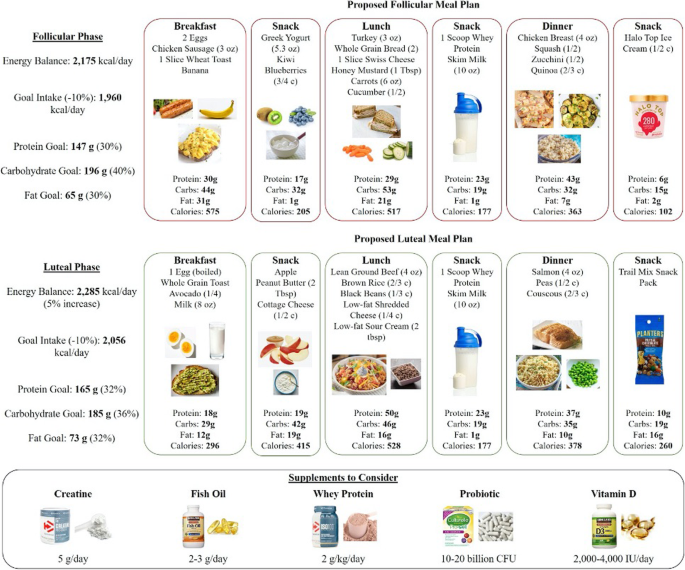
Credit: jissn.biomedcentral.com
Hydration Strategies
Proper hydration is crucial for female athletes. It helps maintain energy levels, improves performance, and supports recovery. Effective hydration strategies include daily hydration and specific practices during exercise. Let’s explore these strategies in detail.
Daily Hydration
Daily hydration ensures that the body stays well-hydrated throughout the day. Female athletes should drink water consistently and not just during workouts.
- Drink at least 8-10 glasses of water daily.
- Include foods with high water content like fruits and vegetables.
- Monitor urine color to ensure proper hydration. Light yellow is ideal.
Incorporate electrolyte-rich drinks if you sweat a lot. Coconut water and sports drinks are good options. Avoid sugary beverages and excess caffeine as they can dehydrate you.
During Exercise
Staying hydrated during exercise is essential for peak performance. Here are some effective strategies:
- Drink 7-10 ounces of water every 10-20 minutes.
- Use a hydration pack or water bottle for easy access.
- Consume electrolyte drinks for sessions longer than 60 minutes.
Monitor sweat loss by weighing yourself before and after exercise. Replace lost fluids by drinking 16-24 ounces of water for every pound lost. This helps maintain fluid balance and prevents dehydration.
| Exercise Duration | Hydration Strategy |
|---|---|
| Less than 1 hour | Water |
| 1-2 hours | Water + Electrolytes |
| More than 2 hours | Electrolyte drinks and snacks |
Practice these strategies to stay hydrated and perform your best.
Meal Planning Tips
Planning meals for female athletes is crucial for optimal performance. It ensures they get the right nutrients for their unique needs. Here are some essential tips to help you create an effective meal plan.
Balanced Meals
A balanced meal includes the right mix of macronutrients. These are proteins, carbohydrates, and fats. Each meal should contain:
- Protein: Helps in muscle repair and growth. Examples: chicken, tofu, beans.
- Carbohydrates: Provides energy for workouts. Examples: brown rice, quinoa, whole wheat bread.
- Fats: Essential for hormone production and brain function. Examples: avocados, nuts, olive oil.
Incorporate a variety of fruits and vegetables. They provide vitamins, minerals, and antioxidants. Here’s a simple table to illustrate a balanced meal:
| Meal Component | Example |
|---|---|
| Protein | Grilled Chicken |
| Carbohydrates | Quinoa |
| Fats | Avocado |
| Vegetables | Steamed Broccoli |
| Fruits | Mixed Berries |
Snacking Smart
Snacks help maintain energy levels between meals. Choose snacks that are high in protein and fiber. Here are some smart snack ideas:
- Greek Yogurt with Honey: High in protein and probiotics.
- Apple Slices with Peanut Butter: Combines fiber and healthy fats.
- Hummus with Carrot Sticks: Offers protein and vitamins.
- Almonds: A great source of healthy fats and protein.
Avoid sugary snacks. They cause energy spikes and crashes. Instead, opt for whole foods. Here’s a quick code snippet for a healthy snack recipe:
Ingredients:
- 1 cup Greek yogurt
- 1 tbsp honey
- 1/2 cup mixed berries
Instructions:
1. Mix the Greek yogurt and honey.
2. Top with mixed berries.
3. Enjoy!
Following these meal planning tips ensures female athletes stay healthy and perform their best.
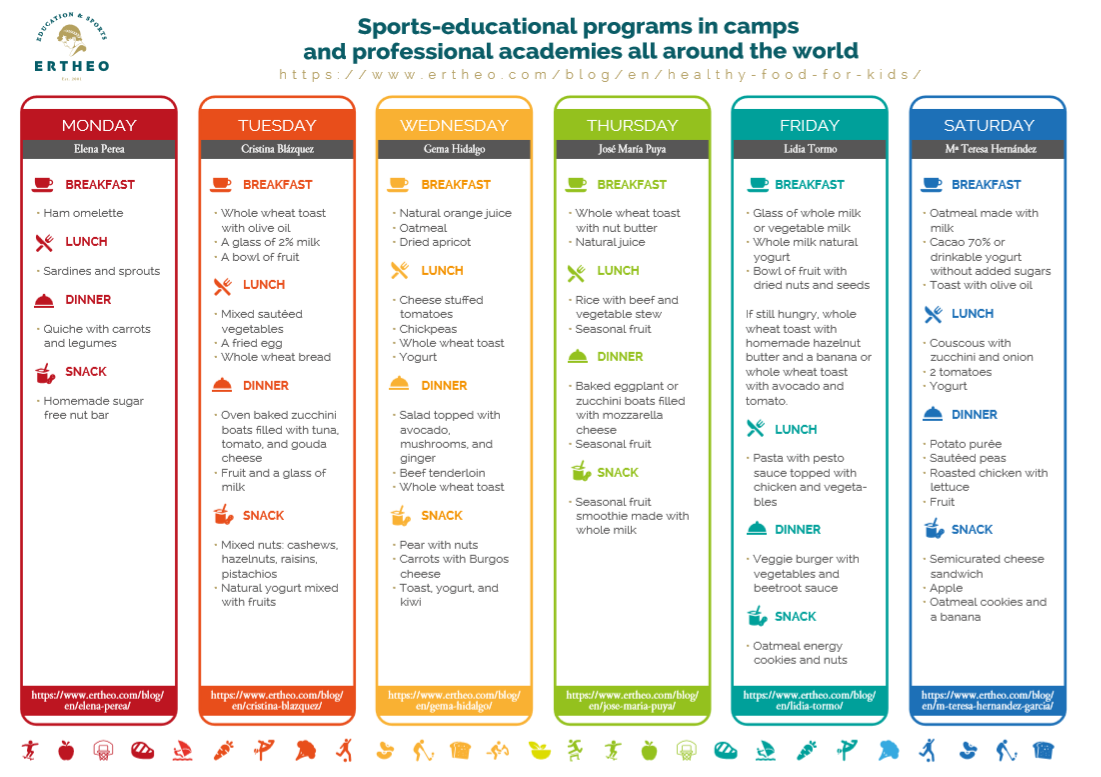
Credit: www.ertheo.com
Sample Meal Plan
A well-balanced meal plan is crucial for female athletes. It ensures they have the energy and nutrients needed for peak performance. Below is a sample meal plan designed to meet these needs. This plan includes a variety of foods to keep meals interesting and nutritious.
Daily Menu
| Meal | Food Items |
|---|---|
| Breakfast |
|
| Mid-Morning Snack |
|
| Lunch |
|
| Afternoon Snack |
|
| Dinner |
|
| Evening Snack |
|
Recipe Ideas
Here are some delicious recipes to try:
- Cook 1 cup of oats in water or milk.
- Top with fresh berries and a drizzle of honey.
- Optional: Add a sprinkle of chia seeds.
- Grill a chicken breast seasoned with salt and pepper.
- Chop and toss with mixed greens, cherry tomatoes, and cucumbers.
- Drizzle with olive oil and balsamic vinegar.
- Preheat the oven to 375°F (190°C).
- Place a salmon fillet on a baking sheet.
- Season with lemon juice, garlic, and dill.
- Bake for 20 minutes or until cooked through.
These recipes are simple yet nutritious, perfect for any female athlete.

Credit: www.loyolamedicine.org
Frequently Asked Questions
What Do Female Olympic Athletes Eat?
Female Olympic athletes eat balanced diets rich in lean proteins, whole grains, fruits, and vegetables. They stay hydrated and often include healthy fats. Supplements and specific meal plans may be used to meet their nutritional needs.
What Is The Diet Plan For An Athlete?
An athlete’s diet plan includes lean proteins, complex carbs, healthy fats, fruits, vegetables, and plenty of water. Eat balanced meals and snacks.
What Should A 17 Year Old Female Athlete Eat?
A 17-year-old female athlete should eat lean proteins, whole grains, fruits, vegetables, and healthy fats. Stay hydrated with water. Avoid processed foods and sugary drinks.
What Is A 50 25 25 Meal Plan?
A 50 25 25 meal plan divides your daily calories into 50% carbohydrates, 25% protein, and 25% fats. This balanced approach helps manage weight, energy, and nutrition effectively.
What Is A Female Athlete Meal Plan?
A structured diet plan designed to meet nutritional needs of female athletes.
Why Is Nutrition Important For Female Athletes?
Nutrition supports performance, recovery, and overall health for female athletes.
How Many Calories Should Female Athletes Consume?
Female athletes typically need 2,000-2,500 calories daily, depending on activity level.
What Are Key Nutrients For Female Athletes?
Key nutrients include protein, carbohydrates, healthy fats, vitamins, and minerals.
What Should Female Athletes Eat Before Training?
A balanced meal with carbs and protein, like oatmeal and fruit, is ideal.
Are Supplements Necessary For Female Athletes?
Supplements can help if dietary intake is insufficient but should be used cautiously.
Conclusion
A well-balanced meal plan is essential for female athletes. It fuels performance and aids recovery. Proper nutrition enhances strength, endurance, and overall health. By following a tailored meal plan, athletes can achieve their goals. Remember, consistency is key. Stay committed and enjoy the benefits of optimal nutrition.
As an Amazon Associate, I earn from qualifying purchases


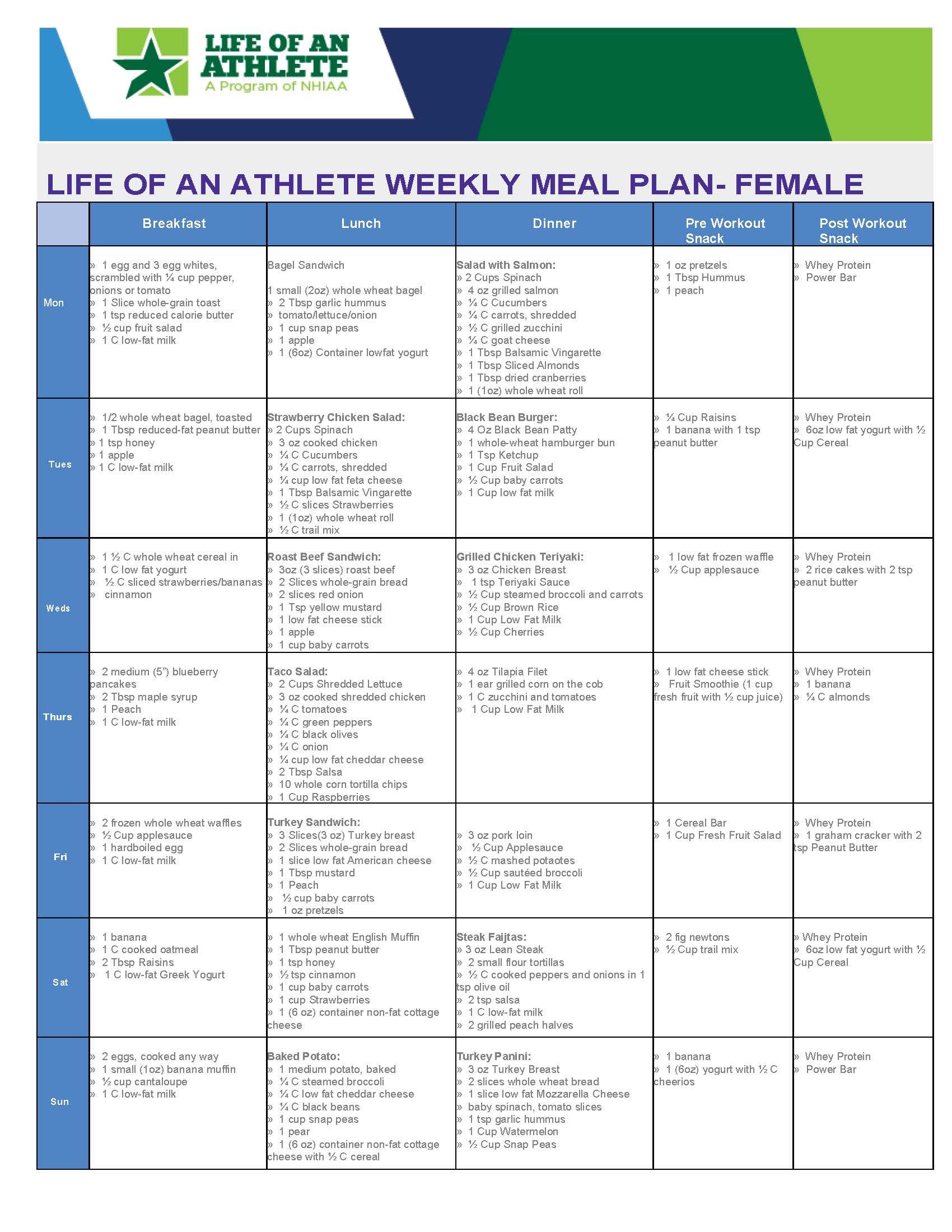




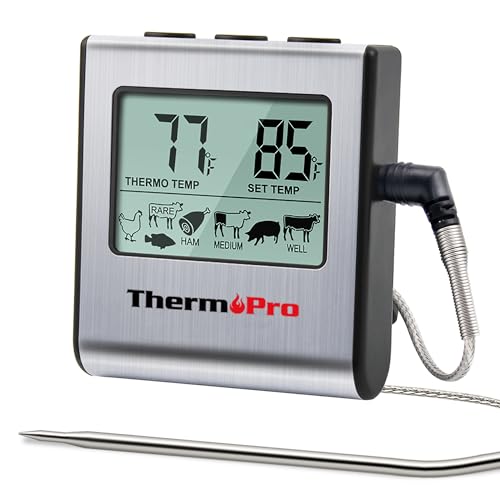
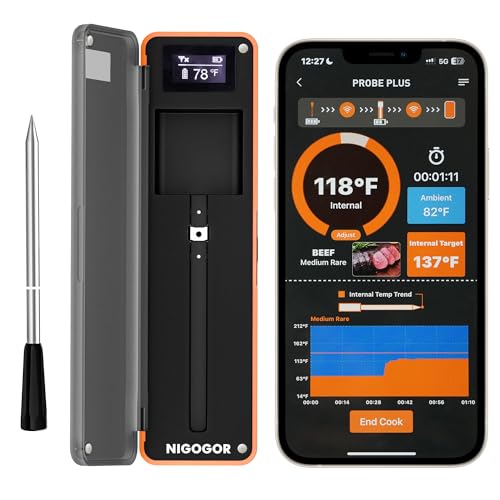
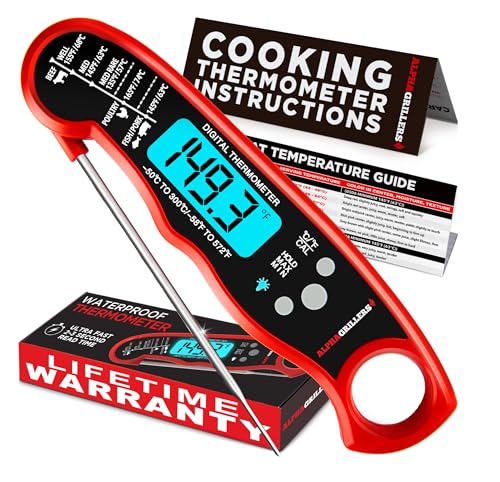
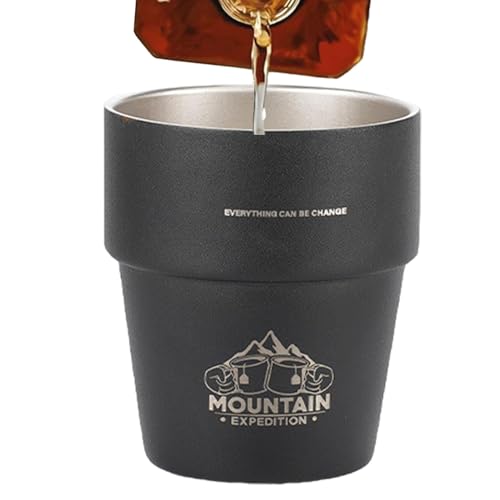
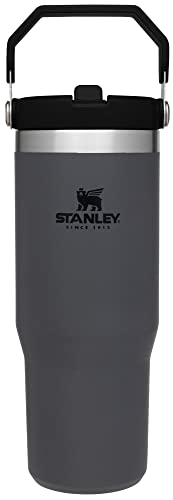
Leave a Reply